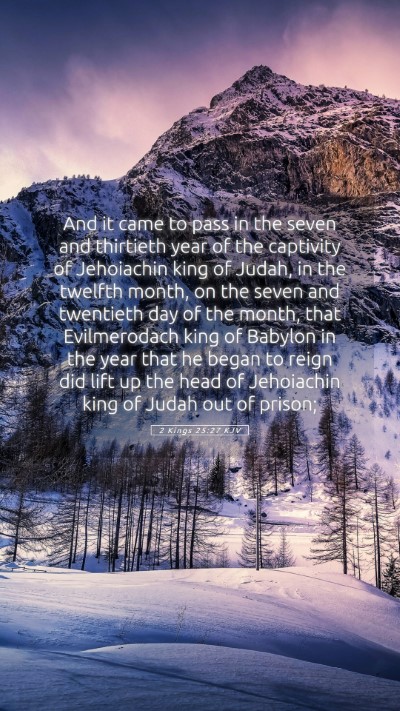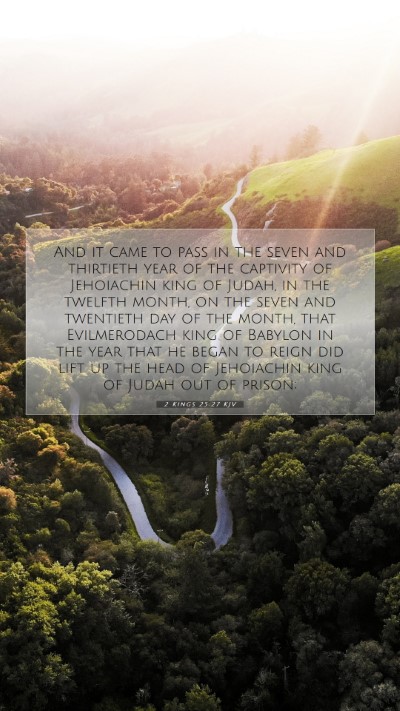Understanding 2 Kings 25:27
Verse: "And it came to pass in the thirty-seventh year of the captivity of Jehoiachin king of Judah, in the twelfth month, on the twenty-seventh day of the month, that Evil-merodach king of Babylon in the year that he began to reign did lift up the head of Jehoiachin king of Judah out of prison." (2 Kings 25:27)
Overview of the Verse
This verse marks a significant moment in the narrative of Israel's history, specifically regarding the fall of Jerusalem and the subsequent captivity. It serves as a transition point, indicating hope and restoration for Jehoiachin, the exiled king of Judah, after years of captivity in Babylon.
Key Themes and Insights
- Historical Context: The events following Jerusalem's destruction in 586 B.C. are pivotal in understanding the exile's impact on the Jewish people.
- Divine Providence: The mention of Evil-merodach’s actions demonstrates that even in captivity, God's plans unfold according to His timing.
- Restoration and Hope: Jehoiachin's release signifies a flicker of hope amidst despair, reflecting God's mercy and the promise of restoration for His people.
Bible Verse Meanings
According to Matthew Henry, this verse encapsulates the beginning of a new chapter for Judah's leadership. Jehoiachin's release not only serves as a personal vindication but also points towards the eventual restoration of Israel. Albert Barnes emphasizes the significance of Evil-merodach’s kindness, highlighting it as a fulfillment of divine mercy. Meanwhile, Adam Clarke elaborates on the timeline, recognizing the importance of the 37-year captivity as a reminder of the consequences of sin and rebellion against God.
Deeper Analysis
Understanding this verse requires a look into several elements:
- The Captivity of Jehoiachin: Jehoiachin was king during a tumultuous period, and his downfall exemplifies Israel’s spiritual decline.
- The Role of Babylon: As the dominant power of the time, Babylon's movements can be interpreted as part of God's overarching plan.
- Evil-merodach's Ruling: His actions could be seen as a foreshadowing of the eventual restoration of Judah, showing glimpses of mercy amidst judgment.
Application of the Verse
For individuals seeking to apply the insights from this verse to daily life, it is crucial to recognize the themes of restoration and hope inherent in God's nature. Even in periods of hardship, believers can find solace in the fact that God's plans for redemption are still very much alive.
Bible Verse Commentary
This verse provides rich material for Bible verse commentary and understanding within Bible study groups. It invites discussions on the interplay between divine sovereignty and human history, as well as how personal and collective redemption plays out within Scripture.
Cross References
For further study, consider the following related verses:
- Jeremiah 52:31-34: Details the hope of Jehoiachin's future restoration.
- Lamentations 3:22-23: Highlights God’s faithfulness and mercy even amidst judgment.
- Isaiah 40:1-2: Discusses comfort and redemption for God's people after suffering.
Conclusion
2 Kings 25:27 serves as a pivotal reminder of God's sovereignty and the promise of restoration. By studying this passage along with surrounding texts and themes, one gains a richer understanding of the complexities of Israel’s history and the hope found within God's mercy. Engaging in Bible study insights and scripture analysis is essential for grasping the significant meanings of Scripture.


